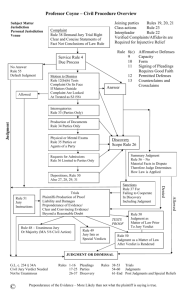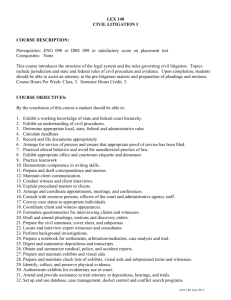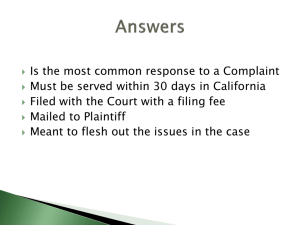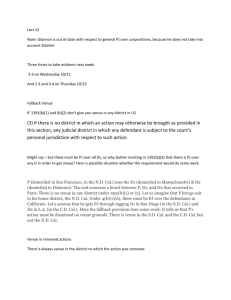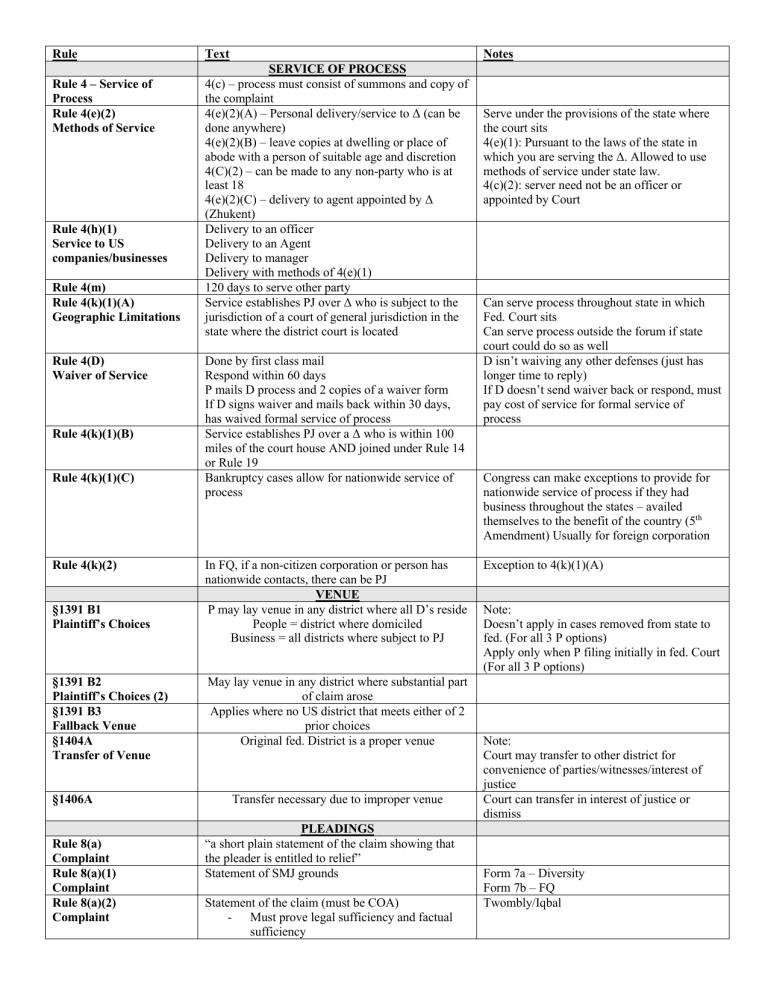
Rule Rule 4 – Service of Process Rule 4(e)(2) Methods of Service Rule 4(h)(1) Service to US companies/businesses Rule 4(m) Rule 4(k)(1)(A) Geographic Limitations Rule 4(D) Waiver of Service Rule 4(k)(1)(B) Rule 4(k)(1)(C) Rule 4(k)(2) §1391 B1 Plaintiff’s Choices §1391 B2 Plaintiff’s Choices (2) §1391 B3 Fallback Venue §1404A Transfer of Venue §1406A Rule 8(a) Complaint Rule 8(a)(1) Complaint Rule 8(a)(2) Complaint Text Notes SERVICE OF PROCESS 4(c) – process must consist of summons and copy of the complaint 4(e)(2)(A) – Personal delivery/service to Δ (can be done anywhere) 4(e)(2)(B) – leave copies at dwelling or place of abode with a person of suitable age and discretion 4(C)(2) – can be made to any non-party who is at least 18 4(e)(2)(C) – delivery to agent appointed by Δ (Zhukent) Delivery to an officer Delivery to an Agent Delivery to manager Delivery with methods of 4(e)(1) 120 days to serve other party Service establishes PJ over Δ who is subject to the jurisdiction of a court of general jurisdiction in the state where the district court is located Done by first class mail Respond within 60 days P mails D process and 2 copies of a waiver form If D signs waiver and mails back within 30 days, has waived formal service of process Service establishes PJ over a Δ who is within 100 miles of the court house AND joined under Rule 14 or Rule 19 Bankruptcy cases allow for nationwide service of process In FQ, if a non-citizen corporation or person has nationwide contacts, there can be PJ VENUE P may lay venue in any district where all D’s reside People = district where domiciled Business = all districts where subject to PJ May lay venue in any district where substantial part of claim arose Applies where no US district that meets either of 2 prior choices Original fed. District is a proper venue Transfer necessary due to improper venue PLEADINGS “a short plain statement of the claim showing that the pleader is entitled to relief” Statement of SMJ grounds Statement of the claim (must be COA) - Must prove legal sufficiency and factual sufficiency Serve under the provisions of the state where the court sits 4(e)(1): Pursuant to the laws of the state in which you are serving the Δ. Allowed to use methods of service under state law. 4(c)(2): server need not be an officer or appointed by Court Can serve process throughout state in which Fed. Court sits Can serve process outside the forum if state court could do so as well D isn’t waiving any other defenses (just has longer time to reply) If D doesn’t send waiver back or respond, must pay cost of service for formal service of process Congress can make exceptions to provide for nationwide service of process if they had business throughout the states – availed themselves to the benefit of the country (5th Amendment) Usually for foreign corporation Exception to 4(k)(1)(A) Note: Doesn’t apply in cases removed from state to fed. (For all 3 P options) Apply only when P filing initially in fed. Court (For all 3 P options) Note: Court may transfer to other district for convenience of parties/witnesses/interest of justice Court can transfer in interest of justice or dismiss Form 7a – Diversity Form 7b – FQ Twombly/Iqbal - Rule 8(a)(3) Rule 8(b) Answer (Admissions, Denials, DKI) Rule 8(b)(6) Failure to Deny Rule 8(c) Affirmative Defenses Rule 8(d)(3) Alternative Statements Rule 9(b) Fraud Pleadings Mistake Pleadings Rule 9(g) Special Damages Rule 10 Form of Pleadings Rule 11(a) Signature Rule 11(b) Certification Rule 11(c) General Sanctions Rule 12 Defendant’s Response Rule 12(b) Motions to Dismiss (Defenses) “allegations must have factual support so that claim does not stop short of the line between possibility and plausibility” Demand for Relief - Should grant relief entitled even if it is more or through another means than requested in the complaint “Must assert a defense to each claim made in the complaint” Rule 8(b)(3) – specific denial Rule 8(b)(5) – Deny Knowledge or Information - Rule 11(b)- DKI cannot be changed to denial at a later date Allegation is admitted if a responsive pleading does not deny an allegation Inconsistent or alternative claims or defenses are allowed Higher standard for these pleadings “with particularity” Heightened pleading standard “with particularity” Every pleading must come with caption stating court’s name, title, file number, type of pleading, and parties’ names Every pleading, motion and other paper must be signed by the attorney By attorney signature – certify that they made reasonable inquiries into the documents “Court may impose an appropriate sanction on any attorney limited to what suffices to deter repetition of the conduct” D can respond to pleading by motion or answer MOTIONS 12(b)(1) – Lack of SMJ (raised at any time) 12(b)(2) – Lack of PJ (use it or lose it) 12(b)(3) – Improper venue (use it or lose it) 12(b)(4) – Insufficient Process (use it or lose it) 12(b)(5) – Insufficient service of process (docs not properly served)(use it or lose it) 12(b)(6) – Failure to state a claim for which relief can be granted 12(b)(7) – Failure to join a party under Rule 19 Rule 12(c) Motion for Judgment on the Pleadings Rule 12(e) Motion for a more definite statement Rule 12(f) Motion to Strike Rule 15(a) Amendments before Trial Rule 54(c) – only default judgments have to match the ad damnum line in the pleadings Rule 15(a) – can amend answer to add affirmative defenses before trial Must comply with Rule 11 – “reasonable under the circumstances” Fraud Pleadings – Stromillo - Non-monetary directives - Penalty to court - Prof responsibility class - Paying attorney’s fees Must respond no later than 21 days after served or risk default Has 60 days to respond if formal service is waived under Rule 4(d) 12(b)(6) – “if a claim is facially adequate then court cannot dismiss the claim” (Neitzke v. Williams) Rule 12(b)(7) – indispensable party Rule 12(d) – if matters outside the pleadings are presented on 12(c) or 12(b)(6) motion, the motion becomes a Rule 56 summary judgment AMENDMENTS Complaint can be amended once within 21 days of serving Δ (Δ permission required) Leave is given freely unless justice does not require it: - Prejudice - Oversight Rule 15(b) Amendments during Trial Rule 15(c) Relation Back Rule 15(d) Supplemental Pleadings Rule 16(a)(1)/26(f) Rule 26(d) Rule 18(a) Joinder in General Rule 13(a)(1) Compulsory Counterclaim Rule 13(a)(2) Exception to Comp. Counterclaim Rule 13(b) Permissive Counterclaim Rule 13(c) Counterclaim maturing or acquired after pleading Rule 13(g) Cross Claim Convenience Bad faith Dilatory motive Delay tactic Court can grant continuance under Rule 15(b)(1) Even if SOL has run, π can file new claim if there is diversity if the claim arises out of the same T/O and other party has notice that satisfied Rule 4(m) May add any transaction, occurrence, or event that happens after date of original pleading PRE-TRIAL CONFERENCES Judge meets with parties to establish discovery schedule within 120 days of Δ being served Order of deposition is determined at pre-trial conference JOINDER (CROSS-CLAIMS AND COUNTERCLAIMS) A party asserting claim may join as many claims as it has against an opposing party Must state counterclaim that arises out of the same T/O and does not require adding another party over whom the court cannot acquire jurisdiction When action was commenced, the claim was subject of another pending action or opposing party sued on its claim that did not establish PJ over pleader A claim that does not arise out of the same T/O as the original claim (can be asserted her or at a later time in new trial) The court may permit a party to file a supplemental pleading asserting a counterclaim that matured after serving an earlier party May state cross claim against a co-party if the claim arises out of the same T/O Must assess SMJ Guarantees SMJ through supplemental jurisdiction because of same T/O - Unless it is a π’s counterclaim (§1367(b)) *if not asserted here cannot be brought in separate trial THIS IS THE ONLY COMPULSORY CLAIM IN THE WORLD Must assess SMJ Must assess SMJ Guarantees SMJ through supplemental jurisdiction because same T/O Once cross claim is brought, that party is subject to compulsory counter-claims Must have one that arises out of the same T/O and then can assert unrelated crossclaims also Rule 13(h) Adding Additional parties through counterclaim Rule 14 Impleader Even if no diversity by adding new party, could still have supplemental jurisdiction but if no PJ then cannot be compulsory counterclaim Rule 24 Intervention 24(a)(2) Intervention of Right – intervening may be harmed if they are not joined When new party is directly liable to Δ if Δ is found to be liable to π (indemnity or tort-feasors) Rule 42(b) – Judge has discretion to pull unrelated crossclaim into separate trial See Rules 19 and 20 Must assess SMJ for 3rd party claim, but venue does not matter (if diversity, Δ and 3PΔ have to be diverse) If Δ is found not liable, then 3PΔ off the hook Can always write amicus brief if not granted Rule 17(a)(1) Real Party Interest 24(b)(2) Permissive Intervention – 1 common question PROPER PARTIES An action must be prosecuted in the name of the real party in interest Up to discretion of court Executor Bailee Guardian Administrator Trustee Party authorized by statute Look to state substantive law to define these terms on case-by-case basis (Naghiu v. Intercontinental) Rule 19 Necessary or Indispensable Parties Rule 20(a) Proper Parties *who can be joined* Rule 56 Summary Judgment Rule 50(a) Directed Verdict Rule 50(a)(1) Judgment as Matter of Law (JMOL) Rule 50(a)(2) Rule 50(b) Judgment not withstanding Verdict (JNOV) Rule 51 Jury Change JOINDER (PARTIES) (a)(1)(A) cannot accord complete relief w/o A (a)(1)(B)(1) A’s interest may be harmed if not joined (a)(1)(B)(2) A may subject Δ to multiple or inconsistent obligations 19(b) factors – prejudice against parties, lessening prejudice by protective provisions, etc, adequacy of judgment without A, whether π would have adequate remedy if action were dismissed for nonjoinder Rule 20(a)(1)- π’s - Claims must arise from same T/O and raise at least one common question of law or fact Rule 20(a)(2) – Δs - Claims must arise from same T/O and raise at least once common question of law or fact JUDGMENTS There is no dispute about material element of fact - Party must present clear and convincing evidence to defeat a properly supported motion for summary judgment (Anderson) - If neither party can enter evidence on single issue, Court will enter summary judgment on single issue – partial summary judgment (Celotex) If Δ believes π has not proved case (has not presented sufficient evidence from which a reasonable fact finder could find her in favor) Δ can move from JMOL Directed Verdict If Δ believes there is no legally sufficient evidentiary basis for a reasonable jury to find for that party on an issue Motion must specify judgment sought and the law/facts that entitle the movant to the judgment May combine with Rule 59 motion for a new trial - Granted if verdict was against weight of new evidence Instructions to jury - Substantive rules - Standards for decision (burden of proof) CLASS ACTIONS 3 steps 1) Must be necessary – uses tests 2) Is joinder feasible 3) If not feasible look at 19(b) factors (not all inclusive) - Must have SMJ ( if new party ruins diversity they cannot be added) Entitled to full res judicata because it is “on the merits” Party cannot rely on pleadings but must enter own Rule 56 evidence otherwise court will likely grant summary judgment 56(d) if non-movant shows they cannot present facts essential, court may allow time to obtain affidavits or declarations or take discovery Motion after π rests case Motion after close of all evidence (before case) Motion after the verdict ONLY if JMOL was made at the close of all evidence and it is made within 10 days of the verdict Rule 23(a) Requirements for Certification 1. 2. 3. 4. Numerosity – class is so numerous that joinder is impracticable – no magic number Commonality – questions of law or fact common to the class (Walmart – only 1 question is sufficient) Typicality – claims or defenses of representative are typical of the class as a whole Representative must fairly and adequately protect the interests of the class SMJ – look to CAFA (minimum diversity and 5 million aggregate claim) Second – look to named parties for diversity Zahn – every class member must be over 75,000 amount in controversy BUT Exxon Mobil – 1 named party over 75,000 is enough PJ – do not need to satisfy minimum contacts for absentee class members (phillips v. Schutts) Venue – look only to named parties Rule 23(b) Types of Class Actions Rule 23(c)(1) Certification Rule 23(c)(2) Notice for class actions (b)(1) prejudice class action (b)(2) declaratory relief (b)(3) class seeking damages (b)(1) and (b)(2) class actions are given “appropriate notice” – though not necessary Erie – if state does not allow class actions, then apply rule 23 unless the state rule is so clearly substantive or intertwined with state law (Shady Grove) (b)(1)(A) – prejudice to the non-class party (b)(1)(B) – prejudice to the members of the class 23(c)(1)(C) - can be altered or amended Only (b)(3) requires individual notice (b)(3) – best notice that is practicable under the circumstances, including individual notice to all members who can be identified through reasonable effort Rule 23(e) Settlement/dismissal Rule 26(a) Initial Disclosures Rule 26(b) Scope and Limitations of Discovery Rule 26(e)(1) Rule 30 Oral Depositions Court will consider – lawyer’s opinions, amount in proportion to amount that could be recovered at trial, any objections, attorney’s fees in proportion to class recovery DISCOVERY Disclose certain facts at the outset of the discovery that are commonly asked and answered Must be relevant to a claim or defense Exemptions from initial disclosure: - Work product (unless you can show you have substantial need for it and cannot get them anywhere else. Rule 26(b)(3)) Obligation to supplement information if you learn that a response was incomplete or inaccurate when you made it 30(c)(2) – counsel ay object to questions posed by opposing counsel but that does not preclude witness from having to answer the question Rule 45 – nonparties can be depose upon notice and subpoena (b)(1) – notice shall be reasonable (10 days prior) (b)(3) and (b)(4) – audio/video/telephone deposition is allowed Rule 32(a)(1) – deposition at trial is not objectionable on hearsay grounds Rule 31 Written Depositions Rule 33 Interrogatories Rule 34 Document Demands (b)(2) – Written answers must be provided within 30 days (d) – can open records and let opposing party dig for needle in the haystack (b)(2) must provide docs within 30 days Usually made in conjunction with Rule 34 document requests Rule 45: Documents can be sought from nonparties (a)(1)(A): “document” any data compilation from which information can be obtained (b)(2)(E): must be produced in the manner they are kept in the usual course of business Rule 35 Physical and Medical Exams Rule 36 Requests for Admissions Rule 37 Sanctions Rule 22 Interpleader Rule 64 QIR Jurisdiction (Quasi in Rem) Need a court order Authenticate documents to become evidence at trial instead of holding deposition every time a new document comes into play (a): motion to compel attorney’s fees (b): failure to comply with court order ETC. - Need complete diversity - Does not confer SMJ - Minimum 75,000.01 amount in controversy - Regular Venue Rules - Regular Service Rules Federal courts use the attachment rules of the state in which they sit 37(a)(4): evasive, incomplete disclosure, answer, or response must be treated as a failure to disclose answer or respond 4(n)(2) – the Δ can be served in the same as in state law for QIR
